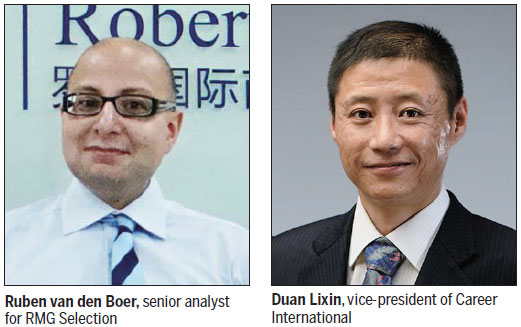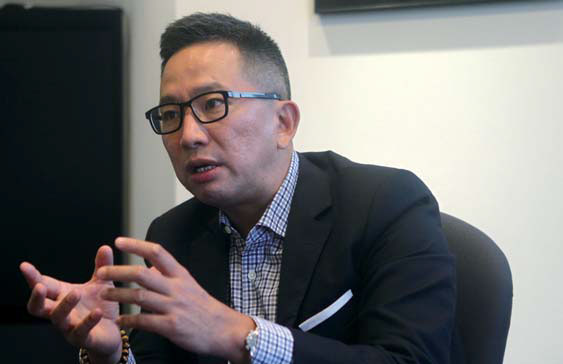Global drive helps recruiters thrive

HR agencies see increase in demand from private Chinese firms and Stated-owned enterprises
China's economic slowdown may have caused concern among some multinational companies, resulting in staff cutbacks, but for those in the recruitment industry, an increase in local clients is proving to be a welcome surprise.
Headhunters and human resource specialists say they have witnessed soaring demand for their services from Chinese companies as more attempt to go global.
| Chinese job candidates in Jiangsu province. From 2012 to 2014, the compound annual growth rate of China's HR industry was 15 percent, according to a report by HRoot. Provided to China Daily |
| George Huang, partner-in-charge of the Beijing office of Heidrick & Struggles. Zou Hong / China Daily |
George Huang, partner-in-charge of the Beijing office of Heidrick & Struggles, an executive recruitment consultancy, says three years ago, about 90 percent of the company's business came from multinational companies. Today, it is only about 60 percent, with the rest coming from local companies, mostly private enterprises.
"This is a big change," he says. "One that has led to a transformation in our team over the past 14 months, as it means we need to change and innovate, to think about how to better serve local companies who have different cultures and requirements in price and other aspects."
The China Human Resource Service Industry Research Report 2015 by researchers HRoot says that, from 2012 to 2014, the compound annual growth rate of the country's HR industry was 15 percent. Last year, the overall scale of the industry reached 140.39 billion yuan ($22.9 billion; 20.6 billion euros), and it is forecast to reach about 315.7 billion yuan in 2019.
From 2012 to 2014, the compound annual growth rate of online recruitment was about 36 percent, with the market worth about 8.73 billion yuan last year.
The Ministry of Human Resources and Social Security last year issued a document on accelerating the development of the HR services industry, stating that, by 2020, the HR industry should be worth 2 trillion yuan and employ more than 500,000 people. The ministry has also encouraged Chinese companies to use headhunters to find high-level executives.
Huang says that in the past few years, the recruitment demand of multinational companies in China has remained stable, albeit with some decrease, while the demand from local companies, mostly privately owned, has soared. It is a trend he expects to continue.
Ruben van den Boer, a senior analyst for RMG Selection, a British recruitment company focused on finding mid-level and senior-level talent, has had a similar experience: "If you called them (local companies) two or three years ago, they would say, 'No, we don't use recruiters.' If you call them now, they will listen, so the energy is changing. They are more open and willing to try."
He estimates that the proportion of clients in his field, the logistic industry, that are multinational corporations has fallen from 90 to 70 percent in the past three or four years.
According to Duan Lixin, vice-president of Career International, which has more than 1,000 consultants across 40 offices in Asia, recruitment services started being offered in China only about 15 years ago and were mostly restricted to multinationals. Today, private companies, stated-owned enterprises and governments are all using the services.
"Many private companies established 20 or 30 years ago are now of a certain scale and want to go global and innovate, so they need more executives with international backgrounds," he says. "Moreover, entrepreneurship is quite strong, there are many active startup companies, so there is an increasing demand for talent and professional services."
Like other recruitment agencies, Career International reported a change in the ratio of its multinational and local clients, from 95-to-5 in 2003 to 70-to-30 today.
With more Chinese companies going global, a move actively supported by the central government, Duan says recruitment agencies are also expanding to keep up with demand.
"We've expanded overseas with our clients because many Chinese companies in different industries have visions in the international market. We want to be the first in the HR industry to have an international vision," he says, adding that the company is planning an initial public offering in the next few months.
Chinese state-owned enterprises are also more open to professional HR advice due to the number of mergers and acquisitions being completed worldwide.
"SOEs are paying great attention to cultivating future leaders and have adopted many professional tools," says Duan, whose company has worked with several SOEs in training and recruitment.
He admits the market is still small, however. Most senior executives at SOEs climb the ranks internally, but many enterprises are now using professional evaluation services. For example, he says, in overseas M&As, Heidrick & Struggles will be hired by an SOE to evaluate its existing talent, judging which managers have enough international experience to work or run a team overseas.
While enterprises in the West have used recruitment services for many years, they are still relatively new to most Chinese companies. Hence, understanding and adapting to these new customers is essential.
"In Europe and the United States, recruitment services have been around longer, and multinational companies are more used to them. It's much easier," Van den Boer explains. "With Chinese companies, it takes time to build trust and to educate them about what kind of service we can bring. Many think recruitment is just about sending a resume, that's it. But that is not what we do."
Fitting in
Cultural integration is the most challenging aspect of recruitment for Chinese companies, as there are differences between the working cultures in China and the West, while many private Chinese companies also have their own unique cultures.
Huang has worked with many large Chinese companies, including Huawei Electronics Co Ltd, Baidu Inc and Lenovo Group. He says the most important goal for a Chinese enterprise is to find someone who can integrate well with the team and perform in an ever changing business environment.
"For example, if Huawei wants to find some research and development talent in Silicon Valley, it's easy to identify candidates with the right skills, but evaluating whether they could perform well in Huawei's company culture is difficult," he says. "So if you think a foreign expert is good but find out they would struggle to get used to China's culture or the company's corporate environment, you have to let the client and the candidate know." He considers a job well done only after a candidate spends two years with a company and has performed well. "If you put high-level people in a company where they can't get on, it hurts both sides. A good consultant will always get a lot of repeat business."
Huang, who was Born in Shanghai and went to New York at age of 14, joined Heidrick & Struggles a year and half ago. He says the most important thing in recruitment is helping a candidate make the right choice, giving them advice on what kind of person the client is looking for and what to take into account before changing career.
"This is our real job; not only recruitment, but identifying the right candidate, giving them advice on how to plan their career, when to change jobs. It's an advisory role, not only to our clients, but also to the candidates," he says. "You have to know about all your candidates, their career history, family situation. They place their trust in you, and you have to take it very seriously and care for them."
As the Chinese recruitment market has changed, so too have the companies' requirements for the talent. For example, Huang says every industry is now talking about digital convergence, so executives with experience and skills in convergence are more in demand.
"In the past, if a company wanted a chief marketing officer, they would want someone who knows about branding. Now, they want someone who knows about branding, and also has a technical background and can understand big data," he says. "So when choosing candidates, experience is less important and their passion and quick-learning agility and capacity becomes more essential."
Duan adds that in the past few years, the demand for talent has grown tenfold, and supply has been unable to keep up with demand. That is why, in China, people at management level are often younger than their Western counterparts.
Van den Boer says this year he feels there is more competition in China's HR market, as the industry has become more valued, and that there are not only multinational headhunting companies battling it out for business, but also more and more local service providers.
"It's a competitive business," he says. "In Europe, it's really easy (for a company) to say in January that they want this person on board in July. We can make a plan for that to happen. But in China, in June, somebody resigns and that company will want somebody else to replace them in two weeks. The pace is much faster."
Early on, when the industry was still new to Chinese companies, recruitment agencies were able to build their business easily, he says. Today, however, recruiters increasingly need to specialize in order to develop market share.
"If you don't grow with the market, if you don't build your company, if you don't focus, it is harder," he adds. "It's not about just coming in and getting a piece of the pie."
chenyingqun@chinadaily.com.cn

(China Daily European Weekly 07/24/2015 page14)
Today's Top News
- Japan tempting fate if it interferes in the situation of Taiwan Strait
- Stable trade ties benefit China, US
- Experts advocate increasing scope of BRI to include soft power sectors
- New engine powers cargo drone expansion
- China to boost green industry cooperation
- Manufacturing PMI rises in November
































